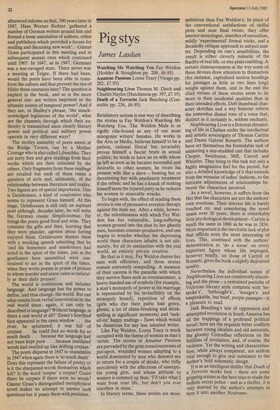Pig stys
James Lasdun
Watching Me Watching You Fay Weldon (Hodder & Stoughton pp. 208, £6.95) Amateur Passions Lorna Tracy (Virago pp. 202, £7.95) Neighbouring Lives Thomas M. Disch and Charles Naylor (Hutchinson pp. 397, £7.95) Death of a Terrorist Jack Beeching (Constable pp. 236, £6.95) Retaliatory sexism is one way of describing the stories in Fay Weldon's Watching Me Watching You. The Weldon Male is as rigidly role-bound as any of our most misogynist writers' females. He works in the Arts or Media, believes himself to be a patient, rational liberal but invariably proves himself a fascist brute in sexual politics; he tends to have an ex-wife whom he left as soon as he became successful and desirable to other women; he treats his present wife like a slave — beating her or threatening her with psychiatric treatment if she rebels; and he has a knack of making himself seem the injured party as he reduces his women to miserable wrecks.
To begin with, the effect of reading these stories is one of persuasive aversion therapy against the male sex. After a while, however, the relentlessness with which Fay Weldon has her vulnerable, long-suffering women ground into the dust by her ghastly men, becomes counter-productive, and one begins to wonder whether the depressing world these characters inhabit is not ultimately, for all its similarities with the real world, an entirely private creation.
Be that as it may, Fay Weldon damns her men with efficiency, and these stories remain extremely compelling. A measure of their success is the panache with which they survive flaws such as overstatement, a heavy-handed use of symbols (for example, a man's monopoly of power in his marriage is represented by his invincibility on the monopoly board), repetition of effects (girls who dye their pubic hair green, ghosts, a lot of china-breaking and drinkspilling at significant moments) and 'tacked-on' happy endings — flaws which would be disastrous for any less talented writer.
Like Fay Weldon, Lorna Tracy is much occupied with the theme of woman as man's victim. The stones in Amateur Passions are pervaded by the grim consciousnesses of put-upon, wounded women adapting to a world dominated by men who demand sex in return for a couple of drinks, who trifle mercilessly with the affections of susceptible young girls, and whose attitude to women is summed up thus: 'I'll take what I want from your life, but don't you ever interfere in mine.'
In literary terms, these stories are more ambitious than Fay Weldon's. In place of the conventional satisfactions of skilful plots and neat final twists, they offer interior monologue, snatches of surrealism, mildly 'experimental' formal tricks, and a decidedly oblique approach to subject mat ter. Depending on one's sensibilities, the result is either cleverly mimetic of the fluidity of real life, or else plain rambling. A certain clamourousness in the way some of these devices draw attention to themselves (for instance, capitalised section headings for passages as little as two lines long) weighs against them, and in the end the chief virtues of these stories seem to lie more in their incidental qualities than in their intended effects. Deft thumbnail char acter sketches and a wry humour relieve the somewhat dismal tone of a voice that, distinct as it certainly is, seldom enchants.
Neighbouring Lives is a fictional chronicling of life in Chelsea under the intellectual and artistic sovereignty of Thomas Carlyle and Dante Gabriel Rossetti. The authors have set themselves the formidable task of animating a star-studded cast that includes Chopin, Swinburne, Mill, Carroll and Whistler. They bring to this task not only a highly imaginative feel for the period, but also a detailed knowledge of it that extends from the minutiae of ladies' fashions, to the intricate adjustments of relationships between the characters involved.
As a novel, however, it suffers from the fact that the characters are not the authors' own creations. Their interior life is barely touched on, and considering the novel spans over 30 years, there is remarkably little psychological development — Carlyle is much the same in 1866 as he was in 1834.
More important is the inevitable lack of plot that afflicts even the most interesting of lives. This, combined with the authors' determination to 'do a scene' on every important figure whose life impinged, however briefly, on those of Carlyle or Rossetti, gives the book a slightly disjointed quality. Nevertheless the individual scenes of Neighbouring Lives are consistently absorb ing and the prose — a restrained pastiche of Victorian literary style complete with 'bespoke's', 'bethought's', `maugre's and unspeakable, but brief, purple passages — is a pleasure to read. Jack Beeching's tale of oppression and attempted revolution in South America has all the trappings of a profound political novel; here are the requisite bitter conflicts between young idealists and old autocrats, the gloomy Conradian reflections on the futilities of revolution, and, of course, the violence. Yet the writing and characterisa tion, while always competent, are seldom vital enough to give real substance to the author's bold schematic design.
It is as an intelligent thriller that Death of a Terrorist works best — there are some gripping scenes as the hero tries to elude the sadistic secret police — and as a thriller, it is only marred by the author's attempts to turn it into another Nostromo.


































 Previous page
Previous page